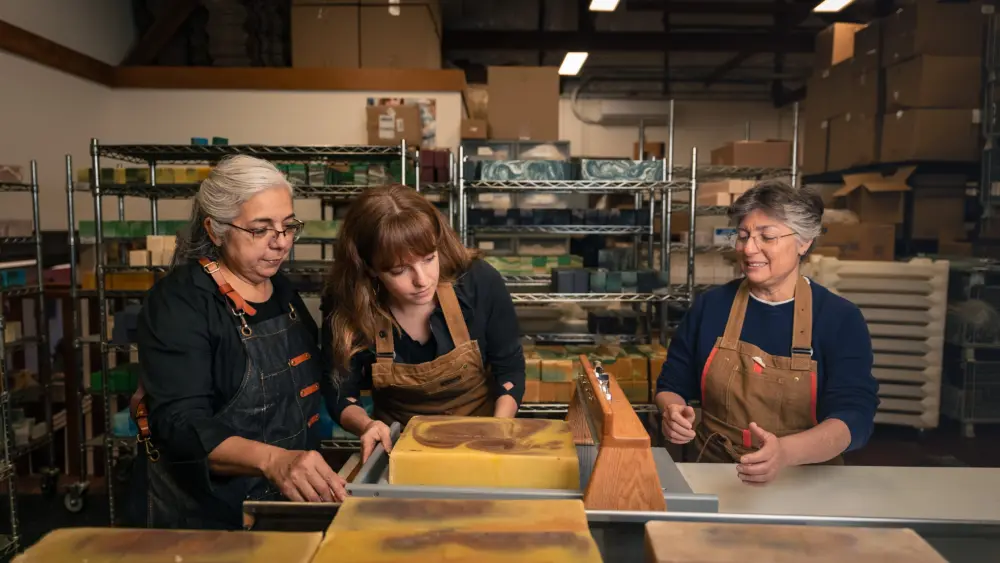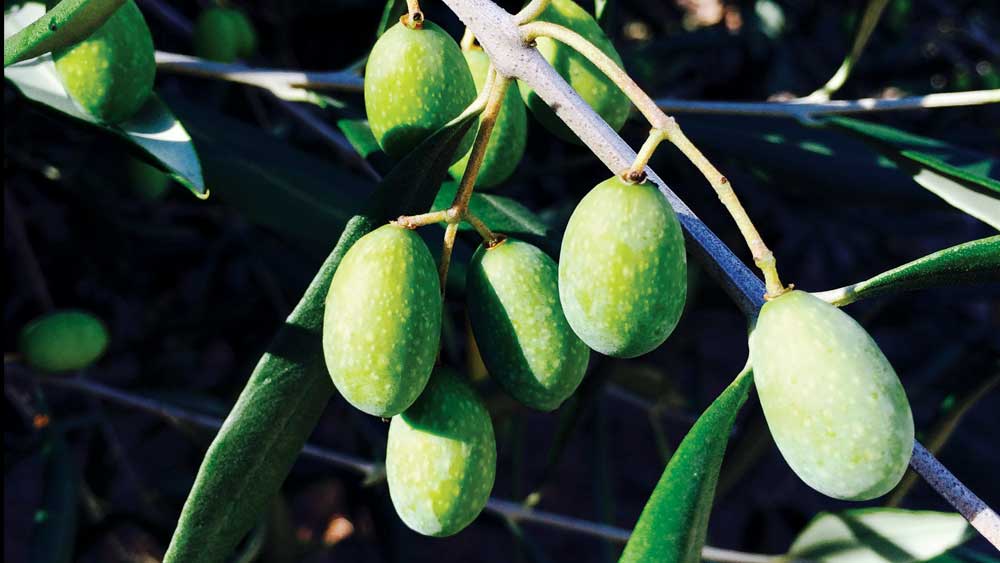
In Greek mythology, the minor god Aristaeus was a rustic god of the countryside and pastoral places. He was the god of useful arts such as beekeeping, cheesemaking, herding, hunting and olive-growing. He was considered the inventor of olive oil and the press used to extract it, and was responsible for the spread of olive oil throughout the Balkan Peninsula, the Aegean Sea and later Sardinia and Sicily. According to a 2007 article by Paul Vossen of the University of California Cooperative Extension, ancient documents found in Syria show the precious oil was valuable, being five times more expensive than the price of wine. In modern times, olive oil is associated with countries such as Italy, Spain and Greece, a staple used both in the preparation of everyday cooking and fine cuisine. Olive trees thrive in a Mediterranean climate characterized by mild, wet winters and warm-to-hot, dry summers–just as grape vines do. So it’s no wonder that California is also an ideal place for olive trees to flourish.
McEvoy Ranch
Nan McEvoy founded McEvoy Ranch in 1990 on a 550 acre former dairy off the Pt. Reyes-Petaluma Road near the northern border of Marin County; she wanted a place where her grandchildren could someday enjoy nature. Nan spent a considerable amount of time in Tuscany and had fallen in love with Italian olive oil. She imported 3,000 seedlings from Italy to her ranch so she could produce the same top-quality olive oil on her own. Today there are 50 acres of Tuscan olive trees including seven varietals: Frantoio, Leccino, Pendolino, Moraiolo, Maurino, Coratina and Leccio del Corno. Each chosen for their unique taste and ability to complement one another when their fruit is milled, to create a signature blend. The trees are nestled among natural ponds, coastal fog and native wildlife, and the grandchildren Nan once dreamed about, along with her son Nion, are now the third generation of McEvoys to produce Extra Virgin Olive Oil (EVOO).
Olive oil is healthy, shelf stable, and there are no genetically modified organisms (GMOs) in artisanal EVOO, which likely contributes to its demand locally and nationally. Samantha Dorsey, president of McEvoy Ranch, says “Many people discover our olive oil when they visit California or when their friends and family who live in the area have it shipped to other parts of the U.S. as a gift.” McEvoy Ranch sells over 5,000 gallons of its olive oil a year, including oils that have been co-milled with fresh herbs or fruit during the pressing process. Each year the team comes up with a new flavor to add to their product line. Last year’s new flavors included Herbes de Provence, blood orange, and garlic.
McEvoy Ranch offers an incredible tasting experience. A variety of EVOO is sampled by dipping a cube of fresh bread into the flavorful oils. Tastings can be done on the patio or inside a large tent with clear windows with a view of the scenic property. The unique tasting is great for those visiting the area who want something other than a wine experience, and even children can partake. McEvoy Ranch has its own wine label, and it’s common for those tasting EVOO to try a glass from the wine portfolio to accompany a tasting. You can also order lunch when you make a reservation and there are workshops, as well, such as a recent one for wreath making in December. December is also the month they release Olio Nuovo, an early-harvest EVOO that is sold fresh and meant to be used within three months after harvest. Dorsey describes it as, “Bright, grassy, slightly bitter and vibrant and unmistakable with a late fall flavor that is perfect for soups, roasted vegetables and bruschetta.”
Many visitors become members of the McEvoy Ranch Social Club, which includes discounts on tastings, tours and hundreds of McEvoy Ranch products. Three times a year, a curated assortment of the best McEvoy Ranch has to offer is available to members for pick-up at the ranch or sent directly to their homes. McEvoy Ranch also makes beauty products, born from the same thought that, “Olive oil is good for you.” Different memberships cater to foodies, wine lovers or both. Dorsey believes McEvoy Ranch employees are proud of the products they sell and enjoy showing them off. “Our work is honorable,” says Dorsey. “Olive oil is an antioxidant that’s an anti-inflammatory, it’s monounsaturated and provides healthy cholesterol. Our olive oil is a product we believe in. When our staff goes home at night, we feel good about the work we’ve done.”
Trattore Farms and Dry Creek Olive Company
Husband and wife Tim and Mary Louise Bucher bought a parcel of land in Sonoma County’s Dry Creek Valley that was once owned by a Spanish land baron. The couple turned it into Trattore Farms, where today they have vineyards and olive orchards.
Tim had always wanted to have a winery and the distinct characteristics of this long, narrow, valley were perfect for the grapes he wanted to grow. The land purchased by the Buchers had a history of olives–and they decided to revitalize that history.
Though many farmers have olive trees in Dry Creek Valley, very few have mills to turn their fruit into oil. The Buchers traveled to Italy in 2005 to purchase a mill. Inspired by the authentic olive milling methods of Italy’s Perugia region, they imported an Italian mill, made by Gruppo Pieralisi, which has manufactured olive mills since 1888. Pieralisi helped them design a custom system that incorporates a traditional granite stone mill and a state-of-the-art hammer mill, providing them with the traditional stone-milling process along with modern milling technology. By combining the two pressing techniques into one mill, they can select which method of press to use based on olive varietal, ripeness and desired oil style. The Buchers say theirs is the only mill in California with these two types of mills in one.
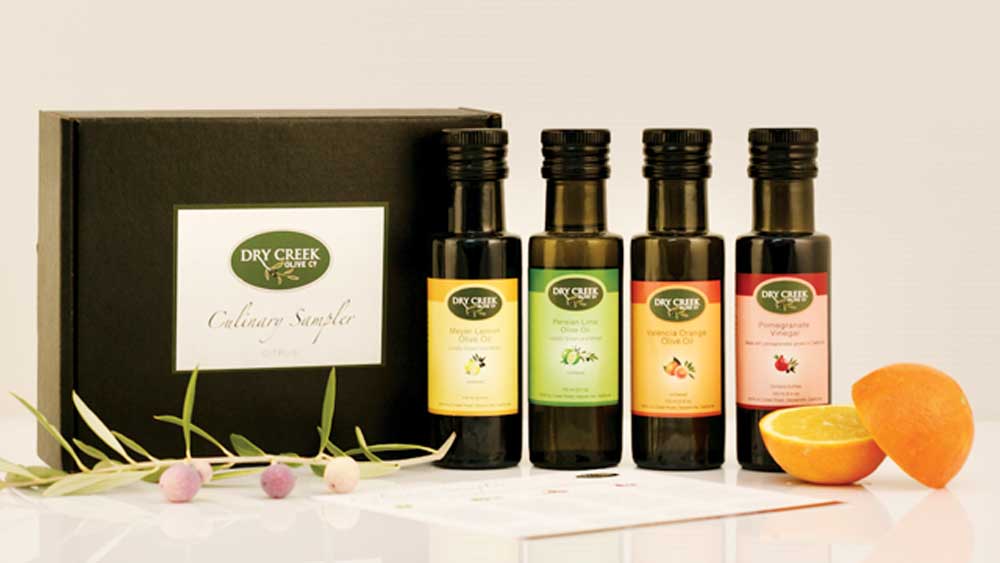
The Buchers began planting trees in 2005 and between 2008 and 2010 they began to see the fruits of their labor turn into liquid goodness. Their oil, produced under the label Dry Creek Olive Company, comes from a blend of Spanish and Italian olives. Mary Louise says, “What really influences the taste of the olive oil is the varietal, the taste is fairly consistent depending on how the olive trees are treated but the soil isn’t as sensitive for taste as it is for grapes.” She says there is a saying, “Olives are easy to grow, hard to harvest, and grapes are hard to grow, but easy to harvest.” Late October is the start of olive harvest season but olives can stay on the tree for many months. All olives ripen from green to black, when you pick them will affect the taste of the oil. Green olives produce an oil with a more vibrant flavor and black olives create an oil with a milder taste. Oxygen, heat and light are the enemies when it comes to olive milling.
The majority of their olive oils come from blends, though Mary Louise does create some mono cultivators, such as the Manzanilla EVOO that is featured in the tasting room.
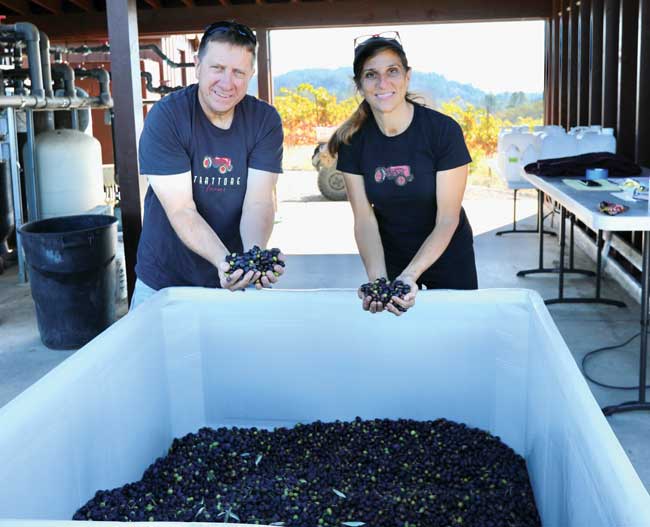
Because not everyone has their own mill, many who grow olives use a community mill. Trattore Farms offers community milling three Sundays during the harvest season. Anyone with olives can come those days to mill communally. The olives have to be of high quality and are combined with the olives of others who are milling that day. Each participant leaves with an amount of oil based on the percentage of olives they brought. About three large buckets produces approximately one gallon of olive oil. People come with kids and dogs, making it a fun community event. “The most rewarding part of producing olive oil is seeing how much people enjoy it. It’s really satisfying,” says Mary Louise.
Napa Valley Olive Oil Company
In the early 20th century, Gugliermo Guidi moved from Italy to San Francisco to live with his brothers, then began to visit the Napa Valley regularly, bringing Italian foodstuffs to the local Italian community. He decided to start his own business serving Italians living in the valley and moved to St. Helena in 1931, purchasing an old cow barn and adding a stone olive mill and hydraulic press, and opening the Napa Valley Olive Oil Manufacturing Company. He soon began producing olive oil from the many olive trees that were growing in the Napa Valley at the time.
In the 1960s, the Particelli family arrived from Italy and took over the Napa Valley Olive Oil Manufacturing Company from their distant cousin, Gugliermo. Over the years, the Particelli’s son, daughter and an aunt came to run the business and today grandchildren Guiles and Stefano, and their great aunt, operate the company, still offering fresh pressed olive oil, prosciutto, salami, sausages, cheeses, peppers, wine and pastas imported from Italy, along with some Spanish and Portuguese gourmet goods, and fresh baked Acme bread.
One olive press still operates on site, though the olives are now sourced primarily from the Tehama County town of Corning, California, since Napa Valley has mostly given way to vineyards. The company sells about 400 gallons of EVOO a week to restaurants, hotels and grocery stores throughout the United States, as well as online and at their retail shop. “A 90-year-old lady came in recently and told me that her grandmother used to bring her to our store to shop,” says Guiles, grateful to have so many long-term customers. Their olive oil is a blend of three varietals: Arbequina, Arbosana, and Mission. “They were the original olives used for the company’s proprietary blend and we continue to use them so that our olive oil has the original flavor profile,” says Guiles.
The biggest change to the company over the years has been the addition of business via their website as they continue to grow by adding new accounts. In addition to their family blend of olive oil, over time they have added 15 flavors of oil and about 10 balsamic vinegars. The vinegars are made especially for them in Modena, Italy. Aside from their original EVOO, an 18-year-aged balsamic vinegar is their biggest seller.
Chileno Valley Olive Oil
Retired physicians Carol and Timothy Gee bought a rundown parcel of land in rural Chileno Valley of Marin 30 years ago. Previously inhabited by farm animals who nibbled most of the vegetation down to nothing, they decided to plant olive trees to help restore the property. Their olive trees are not set up as an agricultural orchid, they are planted in drifts. At the time they purchased the property, they were both working full time and learned about olive farming as they went along. Spread across different areas of their 10 acres, the trees are quite lovely. “We didn’t know what would grow well, so we experimented with different varieties. If you only have one kind of tree and a fungus wipes out that varietal, then you won’t have anything to harvest,” says Carol.
Producing olive oil is more of a hobby for the Gees than a business. They mostly sell to private customers, many whom they meet when selling their EVOO at the Forest Knolls farmstand. Carol says that she thinks the oil they produce is some of the best she’s tasted and feels fortunate that she and her husband have been able to access experts through the UC Davis Olive Center and Robert Mondavi Institute, where they’ve taken courses that are known to be among the best in the country.
They harvest their olives in November and have sold out of their EVOO the last two years by February. It’s about half the price of other boutique EVOO, selling for $32 for 500ml retail.
They use an olive mill at Goldridge Farms in Sebastopol to press their olives and have found the olive oil community to be warm and welcoming. About producing olive oil, Carol says, “It’s humbling, you’re at the mercy of nature, which is so majestic. It’s been a lot of fun and never dull.” She appreciates that Chileno Valley Olive Oil has a loyal following. “One of the nicest things that’s happened to us is when a gentleman returned to the farmstand to buy more olive oil because he said it reminds him of his homeland in the hills of Galilee. He said it tasted just like what his father used to buy in the holy lands of ancient Palestine, now northern Israel. He had never found an olive oil before he had ours that gave him the experience of home.”
BearBird Ranch
Husband and wife team Richardo Santos and Cathy McMillan both had dreams of someday producing olive oil, but they came to their desire from different places. After college, Cathy was in Italy dreaming of becoming a fashion photographer and landed in Florence. Every Friday evening, she would gather with friends to share food and wine. Locals would bring their family’s olive oil to drizzle over fresh Tuscan bread that was roasted on a barbeque, rubbed with garlic and spread with white beans. She was amazed by the tastes of the different oils and was inspired to someday produce her own. Richardo, a native of Ecuador, was drawn to the idea of someday owning an olive orchard. So when an adjacent parcel of land became available next to Cathy’s family property in the San Luis Obispo area, where her uncle had started growing Spanish olive varietals, they purchased it and began the process of making their olive-oil dream come true.
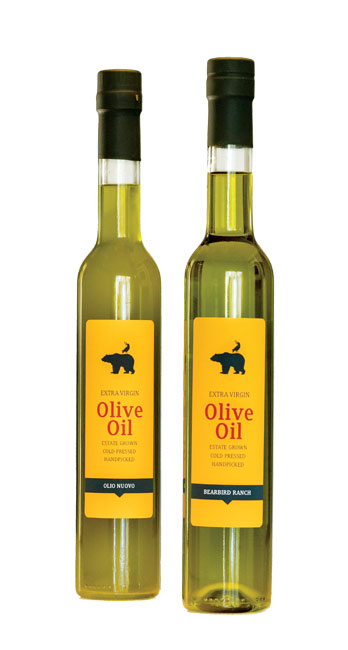
The property had been overgrazed by the previous owner’s cattle and they wanted to bring it back to a healthy state. One of the first things they needed to add to restore the land was trees. Being a statistics sort of fellow, Richardo figured that they would need to plant 600 trees in order to make a return on their investment. They limited their olive orchard to a small part of the property devoted to agriculture. “It was not an easy task changing what was once a grassland to an orchard,” says Richardo. They had to fight the elements, including intense heat, drought, animals and even wildfire. They persevered and today BearBird Ranch produces “liquid sunshine”–EVOO that is estate grown, handpicked and cold-pressed.
Richardo and Cathy started seriously planting in 2014–then lost 200 of their 600 trees to wildfire in the 2019. Some of their high-yield Italian varietals came back naturally after the fire and some had to be replaced. They use a community mill and the owner of the mill has been generous with them, sharing his knowledge about all aspects of olive growing. The Environmental Quality Incentives Program (a program of the U.S. Department of Agriculture) helped them establish waterlines, while integrating conservation efforts so that native plants would thrive, too. “It gives you purpose and leaves a little bit of a legacy,” says Cathy, about reestablishing the land and creating an olive oil company with her husband.
Local Taste Sensation
While in some cases there have been technological advances in picking techniques and modernization of machinery for extracting oil from olives, the concept of fruit-to-bottle remains the same—fresh, cold-pressed olive oil certified as extra virgin, which has not been exposed to chemical or heat treatment, producing one of the most luxurious, best tasting and most popular of all oils. If the gods in ancient Greece had imagined the geographic reach that olive oil would someday have, maybe Aristaeus would not have been known as a lesser god. Perhaps he would have had a home on Mount Olympus full of ornate vessels filled with the precious liquid that he could share with his revered father Apollo and the other immortals who made their legendary homes upon the mountain top.
Luckily for mere mortals, we have access to a wide array of outstanding choices of this special product produced right here in the Golden State. If you’re interested in trying local artisanal olive oil, head out for tastings in Marin, Napa, and Sonoma counties to experience the taste sensation firsthand, and enjoy the scenery and local wines as an added plus.


